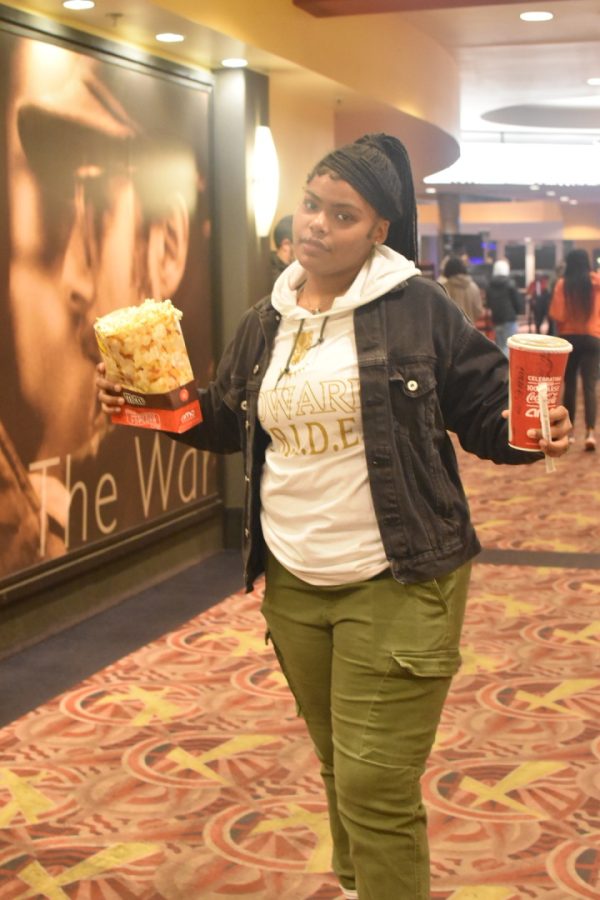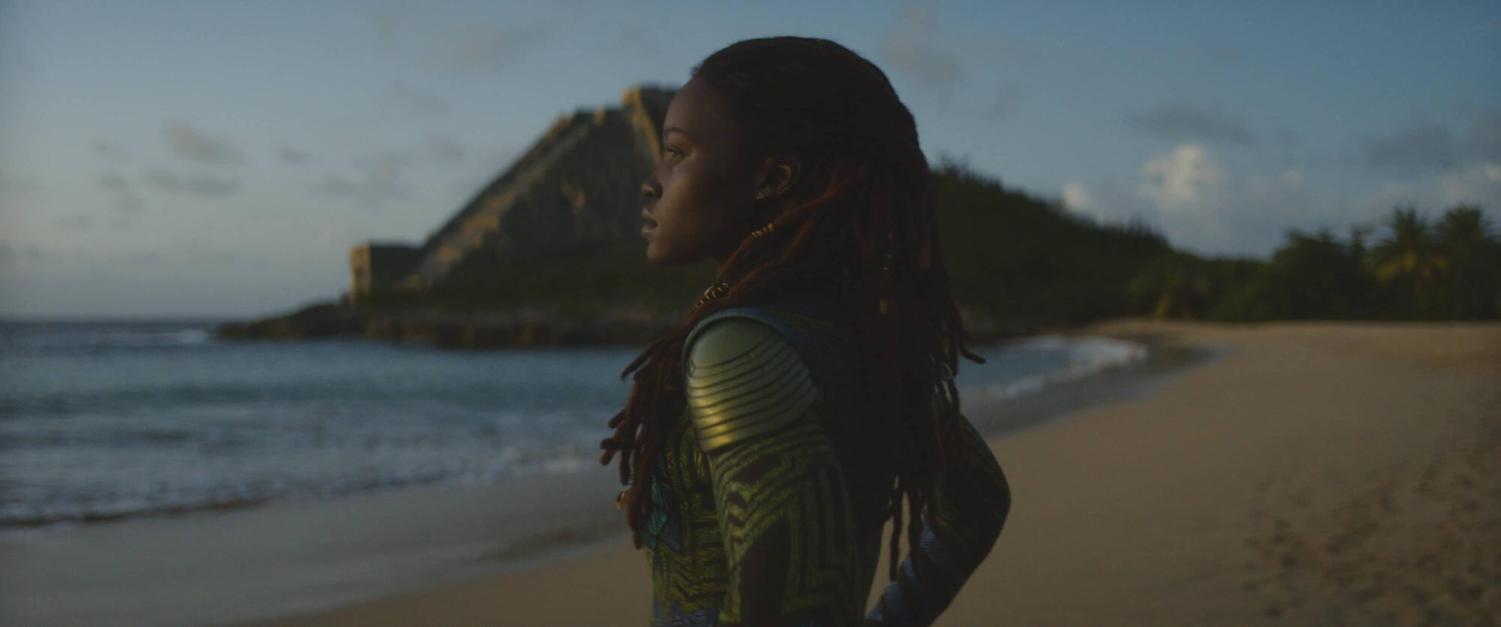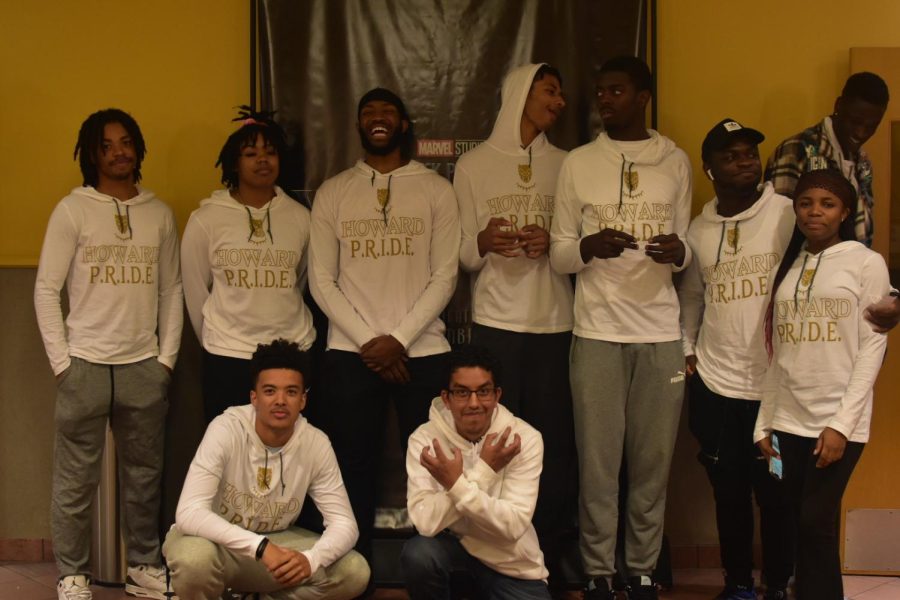“Black Panther: Wakanda Forever” Review (and the Homecoming Showing Experience)
December 1, 2022
Before this student journalist begins, I feel pressed to say I’m uncertain if I’m equipped to cover this.
Not because I’m bad at reviewing—though that may be subjective—or because I’m unworthy to cover this film, but because, in all truth, I’ve not watched any Marvel “MCU” film since “Infinity War.” Yes, not even “Endgame.” This is not out of any distaste for the movies, or any snobbery over superheroes or Marvel films in general. I love superheroes, especially DC, even if the films swing between hit and miss with regular irregularity (although that is a film discussion for another time). Marvel also has produced films I liked, or even loved, and at a far more consistent quality, rarely reaching anything disastrous. Yet that quality, at least as of late and in my eyes, has not been particularly spectacular to get me to purchase a ticket. This is not intended to insult to any fans of the MCU, but in my view, they seem to exist in my headspace like clouds—ever present and known, occasionally observed for a brief moment, but nothing to which I’d really look into, only popping to mind due to the sheer momentum of the films in the public consciousness. Quite simply, I just haven’t been interested in a good while.
That isn’t to say that this new film, “Black Panther: Wakanda Forever,” doesn’t hold anything of note either, at least in regards to the context around it. The film is a sequel to the immensely popular “Black Panther” from 2018, which stirred up popularity for its all-Black cast and subject matter pertaining to fighting for greater equality, in a time when the Black Lives Matter and other cultural movements were pushing forward. I watched it then, and I would agree with many that it was a great movie. Not personally so great as to deserve an Oscar nomination, but for what it was, it was a fine piece of entertainment with something more to say. Now, four years later, the film has returned in a strange time. Enormous reckoning with race has occurred over that time, even more than was happening in 2018, following the wrongful death of George Floyd in 2020. In the midst of that tragedy and the worldwide disruptions of COVID-19’s peak, another tragic death occurred that directly affected the sequel’s production. Chadwick Boseman, the original Black Panther and King T’Challa of Wakanda, died of colon cancer at the age of 43. With the entire film’s production being reshaped amid all these sad events, the film has the opportunity to address and pay tribute to these and make a similarly strong cultural impact.
…Or perhaps not. In that same time, and especially since “Avengers: Endgame” brought the end to the “Infinity Saga” that changed so much of filmmaking, there has been a small but growing number of cracks in one of the largest franchises out there. Some moviegoers have expressed a fatigue at “the Marvel formula,” feeling these films are starting to feel too same-y or dull. In fairness, I’ve primarily seen this expressed within my own circles of friends and family and online content, so that limited view, and the fact that the films, in spite of whatever supposed fatigue, still make billions and billions of dollars for Disney, likely doesn’t hold up to scrutiny. Whatever the case though, it certainly feels to me that the excitement at each passing Marvel movie turns more and more into passive acceptance. In addition, the past year has brought up controversy over Marvel’s special effects and their unsustainable and misguided use of the special effects industry. And in all this time, greater cynicism for corporate progressive posturing has come about, with questions over the use of diversity as a cover for an otherwise mediocre product, or how these films will be suspiciously silent on topics that don’t fly with foreign censors.
I could perhaps go into depth on all this, but I do not have the time, knowledge, experience, confidence or pay to really do so, and I feel as though I can say little except, once again, that I don’t feel prepared or the best at covering this film. But as The HCC Times’s primary film reviewer, I effectively have an obligation to do so, especially after wasting so much time on a Popeye review. Not to mention that as a local feature reporter, this film coincides with an event on our own campus: a special showing for a limited number of HCC students at the AMC theater at the Mall in Columbia. This viewing came one day before “Wakanda Forever” would see its Veterans Day wide-release. And so, since our extremely kind content strategist, Timothy Winans, lent me his own ticket (many thanks) to cover the film and event around it after I came in too late to sign-up, coverage is effectively locked in.
I arrived for the showing in the evening. The event encouraged all attendees to show up in “all white to signify community, culture, and ancestral remembrance as shown in the Black Panther memorial scene.” I don’t have any white pants, and my only available all-white shirt—outside of ratty ones used for pajamas which seemed arguably worse than if I showed up in a motley tropical shirt—was one with a vintage Coke graphic. With little else to do, I decided to wear it along with a pair of jeans and white New Balances.
While this is my first time attending a screening, HCC has apparently coordinated similar events before. Shawn Lamb, an associate director of the Howard P.R.I.D.E., which works to encourage success in Black students, told me at the event that there have been previous screenings for films, at least within the program. “We usually do a viewing at the end of every semester,” he told me, as an effort to build teams and bring students together, as well as to recuperate after finishing midterms. Given the program’s aims to help Black students then, it only seemed appropriate for the program to have this semester’s film be the new “Black Panther” movie. Seemingly these kinds of screenings have also extended to the rest of Student Life groups as a part of HCC Homecoming, with members of SGA and The HCC Times, among others, being in attendance as well.
The screening group clustered in the plaza in front of the AMC before the screening, by the strange monoliths that might once have been some kind of water fountain. A measure of the attitudes of the students appears to quash any expectation of the aforementioned “Marvel fatigue” among the general populace. Most among those I interviewed still held the MCU in high regard and were very excited to see the films.
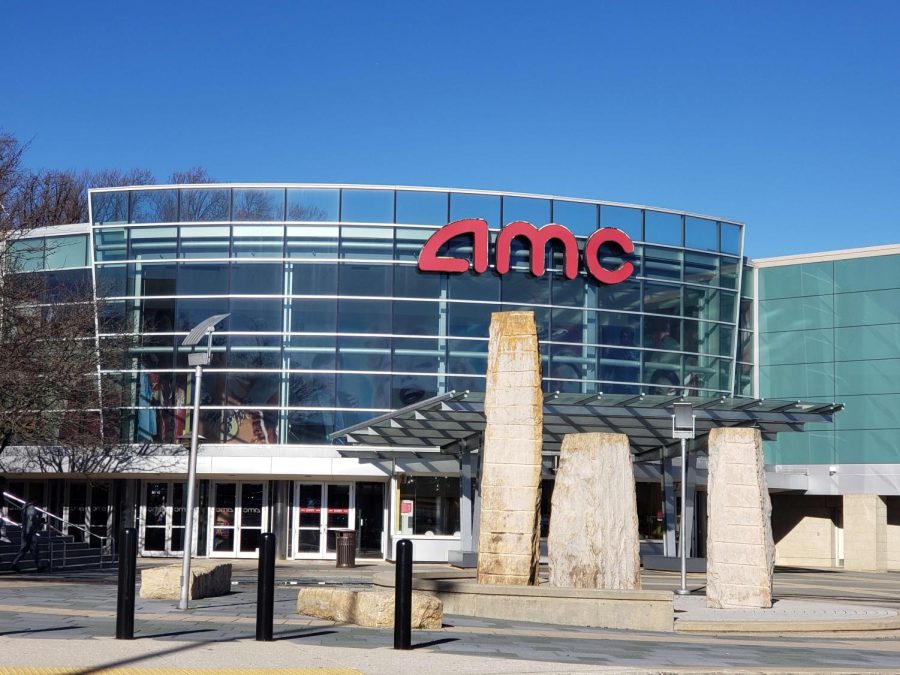
“I think it’s pretty cool, especially as someone into that’s into that type of stuff,” said a Mr. Harriston, a student who participates in Howard P.R.I.D.E. “I’ve seen different Marvel movies, I find them pretty interesting, and I’m a big fan of Black Panther so hopefully this movie really turns out to be great.”
Hannah Macenczak, a Chinese-born student who participates in some Student Life programs, was likewise ecstatic for the film, as she is for other MCU films. “I just love all Marvel movies, really,” she told me before the screening. “As soon as I heard that ‘Black Panther: Wakanda Forever’ was coming out and that we were able to see it for free, I wasted no time in signing up. I love the series, and I just love the adrenaline that I feel whenever I am watching the shows.”
Still, there were some who were seemingly less enthusiastic for the movies, or at least held a less charitable view of it. “It’s a product,” John Leslie, a two-year student at HCC, said to me of the MCU before the show began. “It sells toys partially, but sometimes it’s really, really good, sometimes it’s…meh. Especially after ‘Endgame.'” He did offer praise for the first “Black Panther” in regard to its themes and characters, with its villain, Killmonger, being one of the best, but made a point of how “it’s still a Marvel movie” and how it had to end with a spectacle action scene typical of its films.
For good or bad though, all of us still went in. The theater, for a Thursday night, was still very much packed, presumably for others screenings of this movie. A line formed for attendees to grab free allotted concessions of a small popcorn and drink for each, and we headed into the room. After several minutes of waiting, where most of us chatted—and I grabbed one or two more interviews—the lights dimmed, the crowd hushed and the film began.
So, what were my thoughts?
“Black Panther: Wakanda Forever” opens some years after the first movie with an off-screen death for King T’Challa (The Black Panther), dying of an unknown disease. One year after that and the following funeral, his kingdom of Wakanda, now ruled by the late King’s mother, Queen Ramonda (Angela Bassett), faces great difficulties with the loss of its great protector and his actions from the end of the first film. The destruction of a special plant during the course of the first film means no one can take the abilities of the Black Panther, meaning the country is at a loss without its king or its hero. In addition, after opening Wakanda to the world, the country now faces scrutiny from the international community and powers like the U.S. for not sharing vibranium, a powerful element that is found exclusively in Wakanda that serves as the basis for all its advanced technologies. The nation refuses, stating that the technology would be open to abuse for weapons and that the rest of the world simply isn’t ready to use it. This leads to other countries searching for other possible locations, inadvertently discovering one such source—and another secretive civilization that holds it, likewise not known by the rest of the world. This underwater civilization of Mesoamericans, known as the Talokan, are lead by a powerful figure called Namor, and could stand toe-to-toe with Wakanda. And as the two come to blows, it seems the time calls for a new Black Panther to take up the mantle.
The late Boseman’s death hangs heavy on the film, from the touching, if perhaps understandably sudden, memorial opening (Completed with a modified Marvel title using shots of T’Challa in silence) to some of the themes that the film itself touches on. The death of T’Challa and other family from previous films clearly weigh on Queen Ramonda and the princess Shuri (Letitia Wright), and serves as a great set-up for touching on loss and moving on. There is a nice scene, for instance, between Ramonda and Shuri taking a short getaway together, with a ceremony of throwing their funeral robes into a fire marking the end of the grieving process. From there they have a talk about how those who died and their differing beliefs on their late family’s “presence” and whether it really exists. It’s a sweet and interesting character moment, and there are others of them sprinkled through the film that hint at something greater.
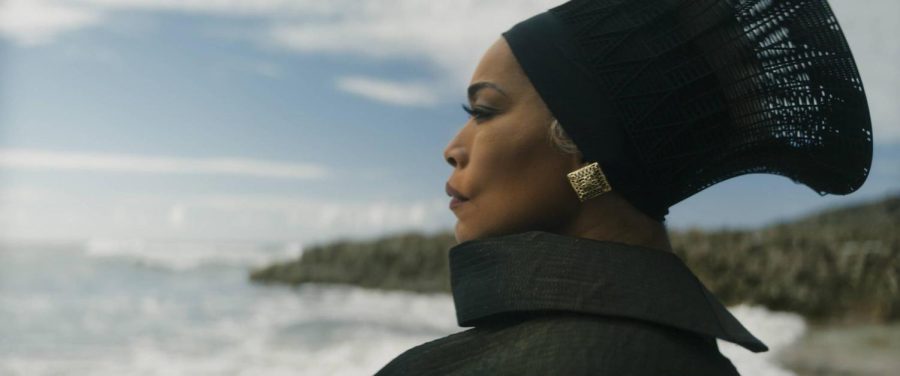
But sadly, there are simply not enough, and what ones are given amount to little. Watching this movie, it felt as though there were three pieces—a film about grief and moving on, one about postcolonialism and reckoning with it, and one that is the typical Marvel action movie—that were hastily or clumsily stitched together without much cohesion for one another. I have the suspicion—though this is pure speculation—that much of what became this movie was adapted from the original idea before Boseman’s death, rather than made wholly new, as it seems to explain why so many elements feel disconnected from one another or don’t conclude as meaningfully as they should. The idea of the Talokan, being a vengeful foil to Wakanda and possibly leading it to question its stance with the world, is a fantastic idea that works as a follow-up to the previous film. It could even work well with the grief story if it were done well enough, yet what we got didn’t develop or properly blend either together in my view.
This extends to the characters as well. While all interesting, performed splendidly by a diverse cast, only a few feel as if they were given a fully developed story, or even a story, and a decent arc. Okoye (Danai Gurira), for example, is the stern yet fiercely loyal commander of Wakanda’s Dora Milaje force, given good moments whether in her deadpan delivery or sincere sadness at having failed Queen Ramonda. Her character has much to offer in the story, yet her arc, as with many others, is squandered or left to conclude with little fanfare. Its character focus is likewise confusing, seemingly splitting the difference between three and four characters before gracelessly deciding to make Shuri’s arc the main focus by the last act, which itself is muddily concluded. There is great potential for here, yet once again, it seems as though the film is unable to focus its efforts to truly realize them, instead reaching a mixed halfway point.
As for the action itself, the spectacle didn’t leave me impressed, and more often than not left me squinting at the screen, wondering who was doing what. Perhaps there was an issue with the screen I viewed the flick on, but so much of the dark scenes set at night or underwater were barely visible to me. When it was visible—and not obscured as well by the occasional shaky cam—the action proved largely underwhelming. Most Marvel visual effects have appeared rather unimpressive to me from what I’ve glimpsed and remembered—even going back to the first “Black Panther”—and while the action here never dips into outright bad, there were films out just this year that I felt vastly outshone this. At best, the action was a decent bit of eye candy, and, at worst, it was detrimental to the film’s own plot. The staple “concluding battle action spectacle” of Marvel movies returns here once again, yet its setup and the conclusion don’t fit with the idea or outcomes of the battle itself or with each other.
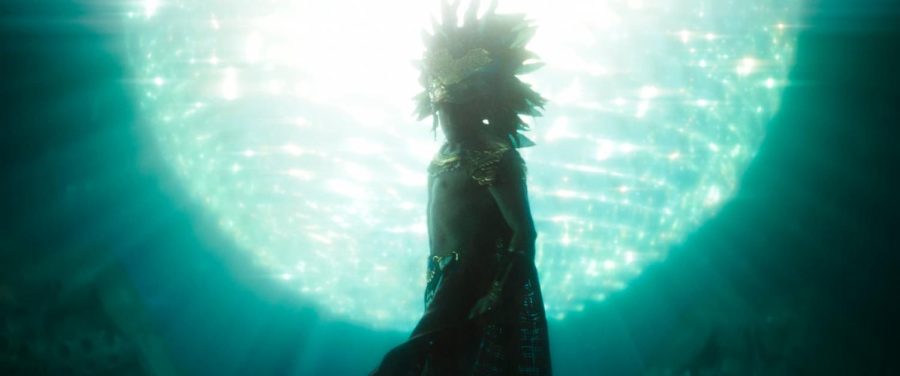
Perhaps this movie just isn’t for me, whether as a non-MCU person or whatever else. There is much to appreciate in the film, from an extended culture with Wakanda and the Talokan, and the great performances of the cast. There are great potential ideas and stories here, but they are only pieces for one that doesn’t properly form one here. I recognize that the troubled circumstances of production may have affected what they could and wanted to do with the movie, but in the end, it makes me wish for a stronger product.
That is just the view of an overthinking writer, however. From the gasps and laughs and cheers of the audience I overheard as the film went on, that view as before seems to be in the minority.
I wasn’t able to gather as many people to interview for their reactions as I was hoping, as most headed straight out of the auditorium after the film ended and I got caught up with the few I did manage to grab. However, most seemed pretty satisfied with the movie. Hannah Macenczak, who I managed to catch again at the movie’s end, was still as enthusiastic for the film and Marvel as ever. “Definitely the action was there, it was everything,” she said. “Even the little teaser at the end has me wondering ‘What was going on?’ (…) Definitely whenever the next one comes out, I am booking a ticket to see it.”
“(The MCU)’s amazing,” said Breonna, another student who was seemingly as enthused for this movie as she was to be interviewed. She likewise thought the movie itself was great, with praise for the outfits and the Rihanna song at the end. John Leslie, who sat near her and whom I also caught again before he left, had somewhat similar reactions to my own. “It’s not for me,” he initially told me bluntly. “In multiple ways, it’s not for me.” He later more clearly expressed that it was “pretty bad,” though it was at least “not ‘Thor: The Dark World.'”
Still, the overall energy for it was positive, with much praise for its cultural aspects. One student, Wilkins, told me how it related to him personally, as an immigrant from Haiti, with the best part of it being the scenes within his home country. “I’m Haitian, so it was really a proud moment when I saw the set in Haiti,” seeing a place that was truly close to him brought before the screen.
While I’m not a fan of the movie, I can’t deny that it’s good to see such representation brought onscreen for people like Wilkins or others. And indeed, even while I wasn’t a big fan of the film as others said, the experience of the showing, and seeing and discussing it together with other students, was a fun one. As Mr. Lamb said, the idea of the viewings was to bring together students, and it did indeed do that. Watching and reacting to the movie, and then seeing what the person right next to you had to say, was a fun experience, from clustering in the plaza with one student bringing along a speaker, to crowding and seating in the theater and subsequent reactions all at once to the various gags and foibles of the film and its character. And perhaps that itself is the fun part of seeing the MCU, or at least moviegoing in general. I may not care for “Black Panther: Wakanda Forever,” and I don’t think I have any plans to return to it afterwards—save maybe Guardians of the Galaxy 3. Yet perhaps it’s this kind of experience before, during and after that made it all worthwhile.
